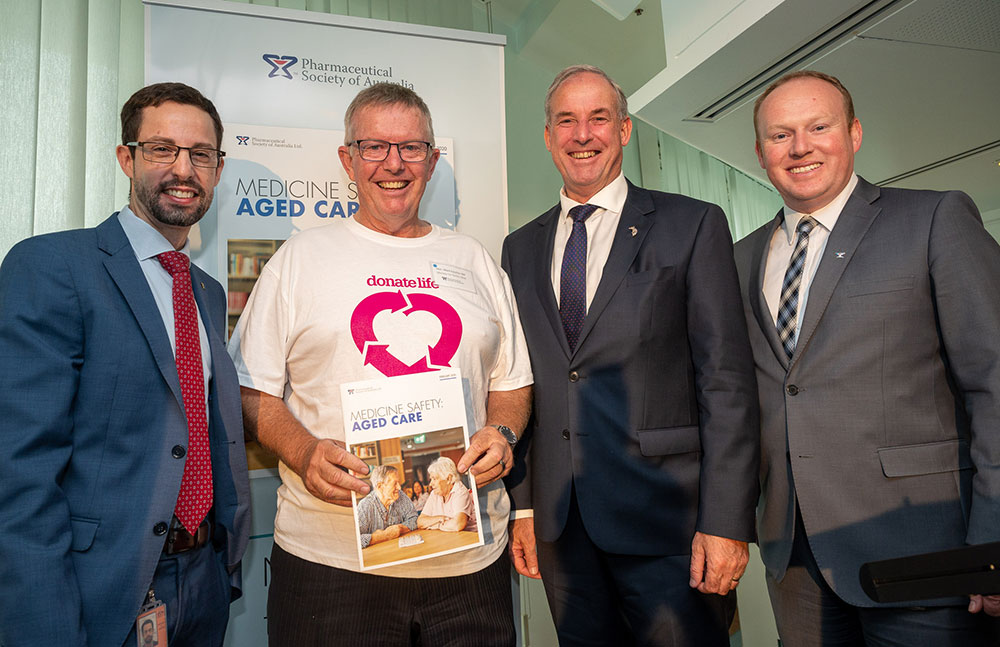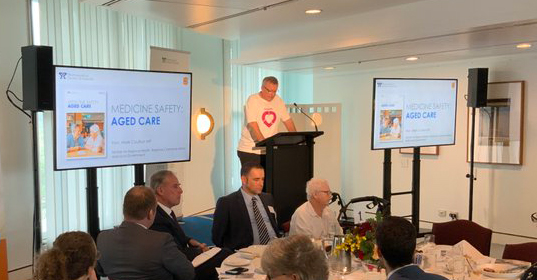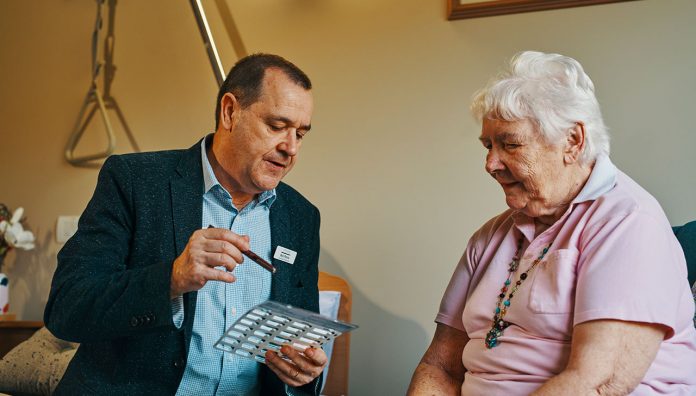One in five unplanned hospital admissions for aged care residents is the result of inappropriate medicines use, a new report from PSA reveals.
The Medicine Safety: Aged Care report, released today, provides an overview of medicine harms in aged care, as well as how pharmacists are essential to reducing them.
Developed by the Quality Use of Medicines and Pharmacy Research Centre at the University of South Australia, led by Professor Libby Roughead, the report sounds an urgent alarm that medicine safety must be tackled without delay, said PSA National President Associate Professor Chris Freeman.
It follows the release of the interim report of the Royal Commission into Aged Care Quality and Safety, which found critical problems with medication management, including overuse of psychotropic medicines on aged care facility residents.
‘The Royal Commission shone a light on significant shortcomings in residential aged care,’ A/Prof Freeman said.
‘Unfortunately, our report has found we are also neglecting vulnerable older Australians when it comes to protecting them from medicine-related harms.’

Speaking at the launch of the report at Parliament House this morning, Minister for Regional Health Mark Coulton stressed the importance of improving medicine safety in aged care.
‘The stories from patients and their families are distressing,’ he said. ‘Chemical restraint must only be used as a last resort.
‘The PSA report provides a path to deliver better medicine safety in aged care. I look forward to working with [PSA] to resolve these [medicine safety] issues.’
Also speaking at the launch, Shadow Minister for Health Chris Bowen said Australians have ‘seen enough’ and that real action is needed on medicine safety.
‘Many of us have had families failed by the [aged care] system,’ he said.

‘Medicine safety is also about universal health care, access to primary care and the role of pharmacists.’
Greens Senator and former GP Richard Di Natale said more must be done to use the skills and expertise of pharmacists.
‘I used to take great joy in going into aged care [as a doctor] and striking out unnecessary or harmful medicines,’ he said.
‘Medicines that started with good intentions but were used for too long or not properly reviewed.’
Jean Fry, a resident at Goodwin Aged Care in Canberra, shared her personal experience.
‘In my opinion, every nursing home should have a pharmacist, just like Richard,’ she said.
Medicine management
More than 200,000 Australians currently live in residential aged care facilities (RACFs). Half of all residents are taking medicines that cause sedation or confusion, with 20% taking antipsychotics and more than half of these taking the medicines for too long, the report found.
In addition, more than 95% of people living in RACFs have at least one problem with their medicines detected at the time of a medicines review; most have three problems.
The Federal Government has gone some way to addressing this by providing $25.5 million to improve medication management programs to reduce the use of medication as a chemical restraint on aged care residents and at home.
However, as medicine experts, pharmacists should be better supported to collaborate with other health professionals and carers to identify and reduce the risk of medicine side-effects and harmful interactions, A/Prof Freeman said.
‘Pharmacists are key to improving the quality and safe use of medicines in aged care,’ he said.
‘When it comes to protecting older Australians, we must support pharmacists to spend more time in aged care and enable them to conduct more frequent medication reviews and follow-ups.’
Pharmacists in aged care can also provide training and advice on medicines to other health care workers. This includes education about the impacts of altering medicines, for example crushing a pill to make it easier to swallow.
‘Pilot programs that have embedded pharmacists in the aged care team have achieved demonstrable improvements in medication safety and quality use of medicines,’ A/Prof Freeman said.
A new way forward
The Medicine Safety: Aged Care report follows the state and federal governments declaring medicine safety a National Health Priority Area last year. Although this was a welcome step, A/Prof Freeman said it must translate into actions and sustainable funding.
To tackle the problem, PSA is calling on the Federal Government to implement 10 recommendations outlined in its report, including:
- embedding pharmacists within aged care facility teams;
- allowing pharmacists to conduct follow-up medication reviews to patients at risk, and removing the caps on the number of medicines reviews that pharmacists can perform;
- remunerating pharmacists to participate in case-conferencing for residents;
- providing targeted activities delivered by pharmacists, such as the RedUSe program;
- providing funding to aged care facilities to implement contemporary electronic medication management solutions, including prescribing, dispensing and administration;
- establishing a Medicine Safety in Aged Care Resource and Support Program to support clinical governance of medicines management within aged care;
- implementing Clinical Governance Principles for Pharmacy Services within residential aged care facilities to guide service delivery that is safe, of high quality and clinically appropriate;
- providing RACFs residents with equitable access to subsidised Dose Administration Aid (DAA) services where clinically warranted and where the use of a DAA is mandated by the facility;
- funding a targeted call for proposals through the Medical Research Future Fund to develop and trial interventions designed to reduce harm associated from medicines for older Australians; and
- developing a standard comprehensive set of safety and quality use of medicine indicators for aged care facilities, and requiring facilities to regularly report outcomes against these measures.
A/Prof Freeman said the 10-point plan would help protect older Australians from medicine harm.
‘We look forward to working with the government, the aged care sector, other healthcare professionals, residents and families to improve this untenable situation,’ he said.
Read PSA’s Medicine Safety: Aged Care report here.



 John Jones MPS, pharmacist immuniser and owner of My Community Pharmacy Shortland in Newcastle, NSW[/caption]
John Jones MPS, pharmacist immuniser and owner of My Community Pharmacy Shortland in Newcastle, NSW[/caption]


 Debbie Rigby FPS explaining how to correctly use different inhaler devices[/caption]
Debbie Rigby FPS explaining how to correctly use different inhaler devices[/caption]




 Professor Sepehr Shakib[/caption]
Professor Sepehr Shakib[/caption]

 Lee McLennan MPS[/caption]
Lee McLennan MPS[/caption]
 Dr Natalie Soulsby FPS, Adv Prac Pharm[/caption]
Dr Natalie Soulsby FPS, Adv Prac Pharm[/caption]
 Joanne Gross MPS[/caption]
Joanne Gross MPS[/caption]





